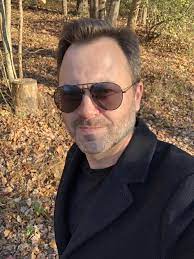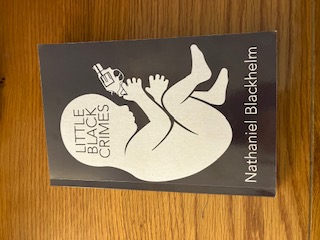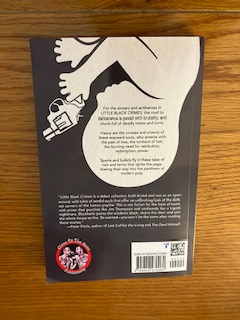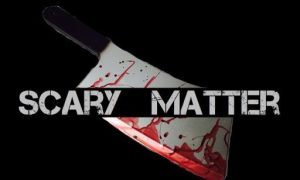
Scary Matter Meets Author Nathaniel Blackhelm
Recently I was gifted a copy of Little Black Crimes by author Nathaniel Blackhelm. Check out my review here. Nathaniel was gracious enough to talk with me about his book. We had a great chat and a few laughs too…
SCARYMATTER: Thank you for doing this, I really appreciate it.
NATHANIEL BLACKHELM: Anytime! I appreciate the opportunity.
SM: The stories in the book are very intense. Where do you get the ideas from:
NB: A number of places. It’s a combo of things. You can get inspiration from real-life invents sometimes, or other times it’s just pure imagination. Sometimes I use stories to make some kind of statement. Or maybe there’s a theme that I’m Interested in expressing. An example of that would be Yellow Light, Red Light. I was really interested in exploring the idea of empathy and how far empathy can go in either a positive or negative way. In the positive – you put yourself in someone’s shoes and try to imagine their life and what they’re going through so you give them a break. But if you use your imagination in a more devious way, you can imagine the worst things happening and taking revenge.

SM: When you write, what comes first? Is it the plot, the character, or is it a slow build of both?
NB: I think that depends on the story. There are certain stories that are derived strictly from plot or some kind of concept that I was interested in. Others are character based. It really depends on what the story requires.
(There was so much more that Nathaniel and I talked about here – but I don’t want to spoil anything in the book!)
SM: One thing that got me about the stories in the book, like Sex Crime Symphony, was the thought that “This could happen”. I’m reading it alone in my apartment thinking “Any minute someone’s gonna bust in and I’m dead!”
NM: I know what you mean. That’s one that readers have had some trouble getting through. That one is partially based on a true story. It’s dedicated to someone I knew when I was a teenager. She had something like that happen to her. For me, that was a way of dealing with that real-life story.
SM: Oh I’m sorry! I get that. So tell me about your writing process.
NM: Ideally when I’m trying to write something, you don’t want to be too judgmental when you’re first trying to get the ideas on a page. It’s just a free flow of thoughts and ideas without any judgment from yourself because you’re your own worst enemy. Just let the ideas flow and then see if they cohere into something. I’d say with these stories there was like a forty percent success rate for me. A lot of stories just don’t make it. You think “oh that’s gonna be a great idea” and you go to put it down and the magic just doesn’t happen so you end up discarding it. Even with the best stories that your write, you put them down and they’re still flawed, but you can’t always see the flaws until later. So later you look back at it. For me, the editing process is even more challenging, because you’re getting ready for someone else to look at. Then picturing it in its final form thinking “What can you do to punch this up? What can you do to add another angle to it?” Or “what can you do to modernize it?” Maybe it has been a while since you wrote it. Even years sometimes. And things have changed in society as far as storytelling or trends. It’s a never-ending process, but you have to put your foot down at some point and say “This is as good as it’s gonna get”.
SM: Some of the stories are very rough. You write some in the first person (like Edgar Allan Poe) – does it get in your head?
NB: Maybe sometimes, but I think it comes with the territory when you’re imagining characters like this. If you choose the first person you’re trying to inhabit a different psyche. In certain ways, it can be disturbing, but in other ways, it can be liberating. With these types of characters – some of them don’t necessarily live by the rules of society, or within the same confines that we do in our everyday life. It can be kind of a fascinating experience. Although I’m not trying to glorify being a deviant in society. But just to be able to imagine that headspace, it can be kind of invigorating, I suppose if that makes sense.

SM: Yes, somewhat. I know you can write stories like that and still be a normal human being.
NB: Exactly. It’s just a matter of imagination. And also to some extent, trying to be responsible as well with the types of stories that you’re telling and the perspectives.
SM: The stories are very timely, gun violence, drugs, and you mention Roe v. Wade. Did you write it recently or was it already in your head?
NM: That (The Misconception) predated Roe v. Wade being overturned. I was looking for something that would get that story going in the right way. I didn’t have it before and then I was thinking that it was looking like that was going to be overturned. It definitely predated it, but I could see things going that way in society. So it did turn out to be timely, as you mentioned, to have that in there.
SM: I was impressed with how you put all those things in there. I liked that you put all that in and then twisted it.
NB: That’s good, thanks!
SM: Which story was the hardest for you to write?
NB: Probably The Misconception. I guess it’s a balancing act because you want to have all the character motivations right, also the story structure. There were drafts where I didn’t have the first section. It would just start out in the mall with the Mari character. But that didn’t feel quite right. I wanted to paint the character Adam, in such a way that you kind of knew he was kind of predatory or strange, but also give him just enough motivation that he might be believable. Or at least that what he was trying to accomplish with his own mission would be palatable.
SM: Who are your writing influences?
NB: Dostoyevsky was a game-changer. When I read Crime and Punishment as a teenager. You’re usually handed the moral code saying – read this book, this character is a good guy and this character is the bad guy, but that book kind of blew that up for me. But that book kind of blew that up for me, that whole schematic of good and bad. He’s a complex character. He’s an academic, but he commits a murder and justifies it by this kind of theorem of “I am extraordinary therefore I should be able to commit this murder”. He thinks he can be alone in society, that he’s somehow above the rules of society. So for me, when I was exposed to a complex character like that, it opened a lot of doors both mentally and creatively if that makes sense. Also, you mentioned Poe… how can you not mention Poe? He was a pioneer, but there’s also his work in short stories. Those are timeless. They have a lot of suspense, they have a really cool setup, and they’re also canonized. They’re all really good. As far as modern writers – I read crime fiction and some horror. I was lucky enough to get a blurb from Peter Farris. His most recent book is called The Devil Himself. If you’re ever in a reading slump, he’s a great writer. He’s very poetic and moves a story along really well.
SM: So what do you have coming up? More short stories or a full-length novel?
NB: I’m working on a couple of different projects at the moment (in between work and family). But I’m just gonna see what I can do next. Of course, eventually, I’d love to have a full-length novel.
SM: I like the short stories! I find that between work and Scary Matter, I rarely have time to sit and read a novel. But with short stories, I can sit and go “Ok, I have time to read one or two and then go to bed and have nightmares”!
NB: (laughs)
SM: Literally I read some of them alone in bed and then got up at least twice to check my front door!
NB: Oh no!!
SM: No – that’s a good sign!
NB: I get commissions from home security companies every time that happens!
(Yep – he’s a dark crime novelist and comedian all rolled up into one tidy package!)
SM: Did you ever get an idea in your head where you had to just stop what you’re doing, run inside, and write it down?
NB: Oh sure! When I get ideas like that they don’t come in the form of language or sentences. They come in the form of either concept or story title, and then I immediately jot it into the notepad on my phone or a post-it on my desk. You don’t want to lose the thought because things can start with just a concept or a title. For me, titles are very enticing. If you come up with an interesting title, and then you want to have your story match the title. It’s just a cool thought that you don’t want to lose.
SM: I really did enjoy the book. It’s very dark, and rough, but interesting and good. There were times I kind of wanted to wash my eyeballs but in a good way
NB: Oh no!
SM: But that shows that it got to me – but in a good way. It wasn’t something I skimmed over. It affected me.
NB: I know what you mean. There are some books that leave a residue. Like The Girl Next Door by Jack Ketchum. That was a rough read. It’s so dark and so hard to get through. It stays with you in a way that’s not exploitative, but it’s more profound and speaks to the cruelty of humanity, you know? It’s one of those books that leaves a residue – like you see it on your shelf and it emits. A dark aura.
SM: I noticed on Goodreads that you also have a list of magazines you were in.
NB: Those are previous publications that over the last ten years I’d appeared in.
SM: Is that how you started writing magazine articles and short stories?
NB: Yeah I’d say short stories, I had written drafts of them. There was a period of four or five years where I was submitting widely, just trying to learn the market and see what I could get published.
SM: Thank you very much for doing this and thanks again for the book!
NB: Sure, anytime. And thanks again for this opportunity, I truly appreciate it!
SM: Absolutely. I’m looking forward to your next book. Keep me posted!
